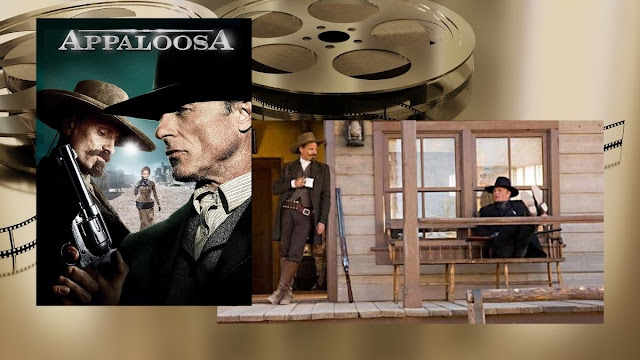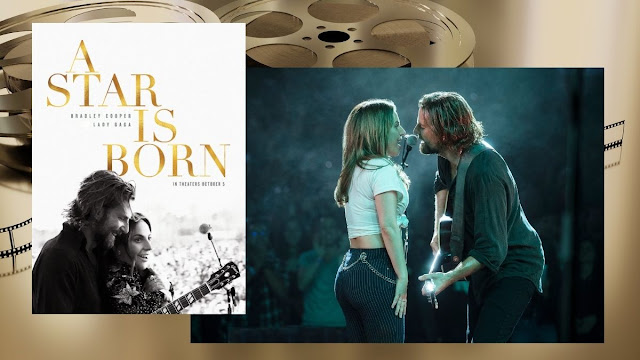Kristin Reviews Appaloosa
Appaloosa was completely overlooked by the Academy, probably because few members had an opportunity to see it. Yet, I knew even as the end credits began that it would be in my top three for the year, and I was pretty sure it would hold the #1 spot (it did).
The film was released in October, just a little too early for Oscar Season, with no fanfare whatsoever. It played in theaters for a few weeks, then disappeared to languish in the rarely browsed western aisle at Blockbuster.
[Note From the Future: Kids, a Blockbuster was a store where people could go pick out movies on videotape or DVD to rent – kind of like Redbox, except much bigger, staffed by employees, and famous for “Be Kind, Rewind” stickers.]
[Note From the Future's Future: Kids, "Be Kind, Rewind," referred to the practice of rewinding the tape in a VHS (or Beta) videotape, so the movie started back at the beginning for the next person.]
On its surface, Appaloosa is a classic western (and anyone who knows me knows I love a good western). As a representative of its genre, it's flawless. All of the required elements are present: horses and vistas and hats; lawmen and lawless men; firearms and men who know how to use them; a shootout in the street. It even features some Native Americans and a steam train.
On its surface, Appaloosa is a classic western (and anyone who knows me knows I love a good western). As a representative of its genre, it's flawless. All of the required elements are present: horses and vistas and hats; lawmen and lawless men; firearms and men who know how to use them; a shootout in the street. It even features some Native Americans and a steam train.
Under the surface, Appaloosa is a deftly crafted combination of thoughtful characterizations and themes. It is first and foremost a surprising and deeply satisfying love story. It's also an exploration of the difference between a lawman and criminal in a land unencumbered by overreaching government intervention. And it even provides an interesting commentary on the fine line between a respectable woman and a whore.
The movie is based on a novel of the same name by Robert B. Parker, and screenwriters Ed Harris (who also directed) and Robert Knott did a magnificent job adapting Parker's concise writing style and story structure to the screen. Both the book and the movie rely almost entirely on character action (as opposed to dialogue) to drive the narrative, and the result is a pleasing exercise in simplicity.
The exploration of what makes a man a "good guy" or a "bad guy" centers around three men, Virgil Cole (Ed Harris) and Everett Hitch (Viggo Mortensen), who are officially lawmen, and Randall Bragg (Jeremy Irons), who is a land owner and a bully (keep in mind, this is the Wild West, so bullies come equipped with guns andranch hands henchmen).
The exploration of what makes a man a "good guy" or a "bad guy" centers around three men, Virgil Cole (Ed Harris) and Everett Hitch (Viggo Mortensen), who are officially lawmen, and Randall Bragg (Jeremy Irons), who is a land owner and a bully (keep in mind, this is the Wild West, so bullies come equipped with guns and
As the film begins, the leaders of a New Mexico Territory town called Appaloosa hire Cole and Hitch to lay down the law and bring Bragg to justice for multiple counts of murder. This seemingly simple white hat versus black hat scenario is more complicated than it seems, however, because, as the town’s higher ups discover, nobody gets that good with a gun without some darkness in him. The lines between the two sides blur even further as the story progresses.
There’s also a woman, a widow named Allison French (Renée Zelwegger), who is, as Hitch clarifies at one point, neither a whore nor a squaw. Allison serves as a source of conflict, but contrary to many of the plot synopses you'll find online (which must have been written by people who had never seen the movie), not through a clichéd love triangle (thank goodness!). While Allison does serve as a "love interest," she is not the focus of the love story at the heart of this movie; she merely serves as a catalyst for narrative elements.
The love story that drives this movie from beginning to end belongs to Cole and Hitch.
Nope. Not like that. This is not a Brokeback Mountain kind of love story.
Not that there's anything wrong with a Brokeback Mountain kind of love story. Brokeback Mountain was a lovely and heartbreaking film. But it is also possible for two men to forge a deep, loving bond without their relationship becoming intimate.
In a refreshing and incredibly rewarding change of pace, Appaloosa is fundamentally about the profound friendship, respect, and loyalty that develop between two men who work together for years as guns for hire. This relationship is deeper and more touching than any “romance” found in movies today.
In movies (and in real life), the choices people make are everything. Dialogue ultimately means nothing because regardless of what one says, his actions demonstrate what's most important to him. With only a few words spoken between them, Cole and Hitch make all the right choices when it comes to what's really important. While not the least bit romantic, their relationship says volumes about the human capacity to understand, accept, and trust one another.
In movies (and in real life), the choices people make are everything. Dialogue ultimately means nothing because regardless of what one says, his actions demonstrate what's most important to him. With only a few words spoken between them, Cole and Hitch make all the right choices when it comes to what's really important. While not the least bit romantic, their relationship says volumes about the human capacity to understand, accept, and trust one another.
In the end, Appaloosa serves up two unforgettable characters who embody the ideals so many of us long for in today’s complex society. The values they represent and the codes by which they live moved and inspired me and cemented this film not only in my top 10 for the year, but in my top 5 movies of all time.
-Kristin
2.26.2009




Comments
Post a Comment